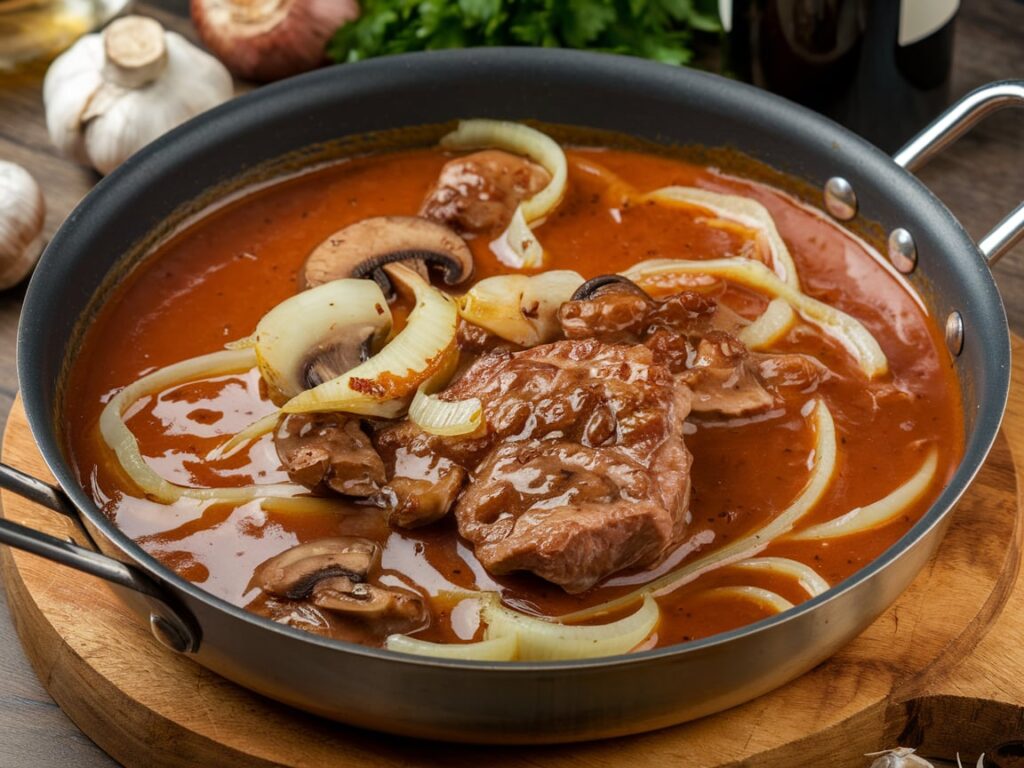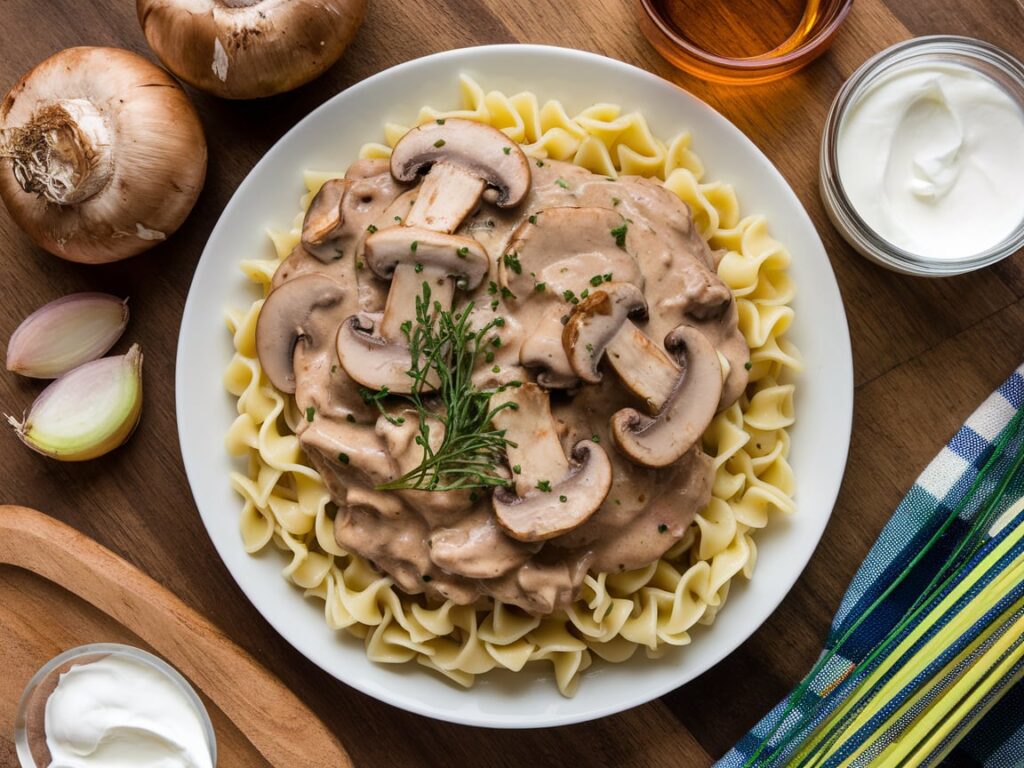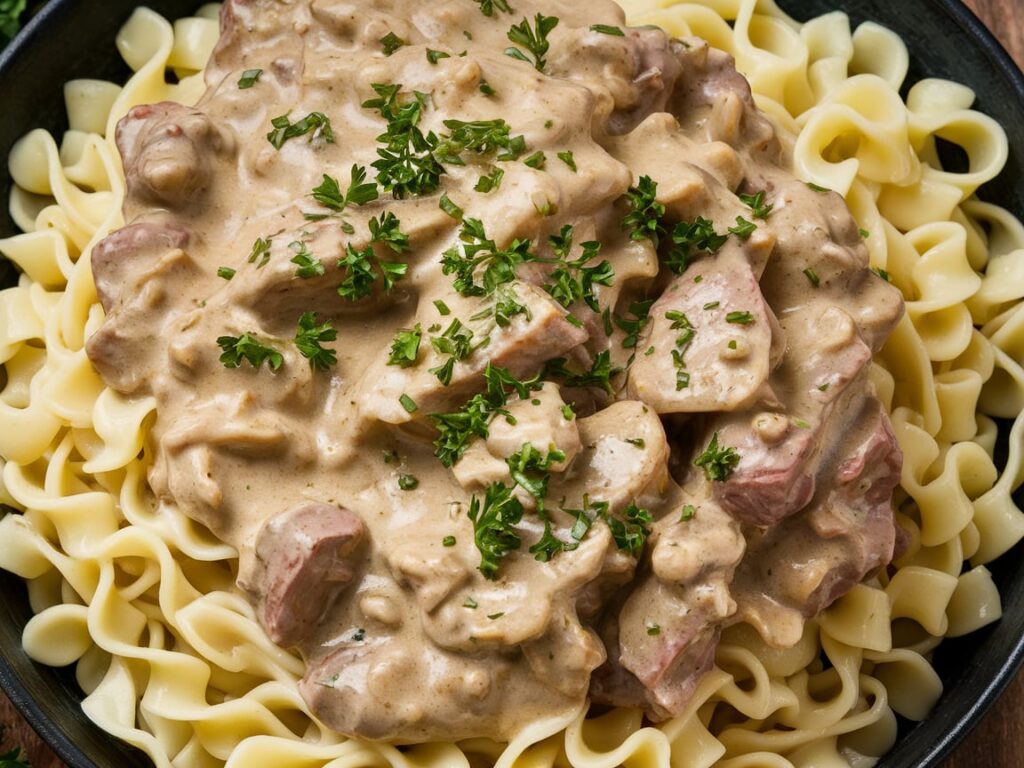Stroganoff is a comforting dish known for its creamy and savory flavors, but sometimes it can turn out bitter, which can ruin its appeal. Fortunately, there are several ways to correct this and restore the balance of flavors. In this guide, we’ll explore common causes of bitterness in stroganoff and offer practical solutions to ensure your dish tastes just right.
Why Does Stroganoff Sometimes Taste Bitter?
Bitterness in stroganoff can result from a few common issues:
- Overcooked onions or garlic, which develop bitterness when browned too much.
- Too much wine or alcohol, especially when not reduced properly.
- Sour cream added too early, causing curdling or a strong, unpleasant flavor.
According to Mistakes Everyone Makes When Cooking Stroganoff, errors like overcooking or using excessive wine without proper reduction can lead to bitterness. Similarly, in the article Beef Stroganoff Without Mushrooms, using the right cooking methods and timing for ingredients like sour cream is essential for achieving a well-balanced dish.
How to Fix Bitter Stroganoff
1. Balance Acidity and Sweetness
One of the easiest ways to counteract bitterness in stroganoff is to balance the flavors. Here’s how:
- Add a pinch of sugar or honey: Sweetness can help offset the bitter flavors, especially if too much wine or sour cream caused the issue.
- Incorporate more dairy: Adding cream or milk can help mellow the bitterness and improve the overall richness of the sauce.
- Add a touch of lemon juice or vinegar: Acidity brightens the dish and can help reduce the bitterness without overpowering the creamy elements.
For more tips on balancing flavors, see how the article What Makes Alfredo Sauce Taste Better explores the role of balancing creaminess and acidity in sauces.
2. Avoid Overcooking or Burning Ingredients
Burned ingredients can be a significant cause of bitterness. Here’s how to prevent burning:
- Cook onions and garlic at low to medium heat: This prevents over-browning, which can lead to bitterness.
- Remove burnt pieces immediately: If any ingredients burn, discard them to avoid spreading the bitter flavor throughout the dish.
3. Use Fresh, High-Quality Ingredients
Fresh ingredients are crucial to avoiding bitterness:
- Use fresh sour cream and dairy products: Expired or old dairy can contribute to a sharp, bitter taste.
- Incorporate fresh herbs like parsley or dill: These herbs can add a bright, fresh flavor to counteract any bitterness.
- Properly reduce wine or alcohol: Ensure the alcohol evaporates fully, leaving behind a flavorful base without bitterness.
Adjusting Cooking Techniques to Fix Bitterness
4. Add Sour Cream at the Right Time
Adding sour cream too early can cause it to curdle, resulting in a bitter taste. Here’s how to avoid this:
- Stir in sour cream at the end: Add it just before serving to prevent curdling and bitterness.
5. Cook Mushrooms and Garlic Separately
Mushrooms and garlic have different cooking times, and overcooking them can introduce bitterness:
- Sauté mushrooms separately to ensure they cook evenly without burning.
- Add garlic at the end to prevent it from turning bitter.
6. Deglaze the Pan Properly
If you brown the meat and vegetables in your stroganoff, the fond (the browned bits stuck to the pan) can burn and turn bitter. To avoid this:
- Deglaze the pan with broth, water, or wine: This lifts the flavorful bits without burning them.
Enhancing Flavor While Reducing Bitterness
7. Add Umami to Balance Bitter Flavors
Adding umami can help mask bitterness and enhance the overall flavor. Here are some options:
- Soy sauce or Worcestershire sauce: Both of these ingredients are rich in umami and can help balance out bitter flavors.
- Tomato paste: A small amount of tomato paste can boost savory notes while reducing bitterness.
- Mushrooms: Properly cooked mushrooms add a rich, earthy flavor that enhances the dish.
8. Fresh Herbs and Spices
Fresh herbs and spices can reduce bitterness and brighten the dish:
- Fresh parsley, dill, or thyme: Adding herbs at the end can bring a fresh, vibrant flavor that complements the creamy sauce.
- Spices like paprika or nutmeg: These add warmth and depth to the dish, balancing out any harsh flavors.
9. Soften Bitterness with Dairy
If your stroganoff is too bitter, more dairy can help smooth out the flavors:
- Add cream or milk: This can mellow the bitterness and make the sauce creamier.
- Butter: Adding a bit of butter can enhance the richness and balance out the sharpness of any bitter ingredients.
FAQs on Making Stroganoff Less Bitter
Why does my stroganoff taste bitter?
Bitterness can occur due to overcooked ingredients, too much wine, or sour cream curdling during cooking. Ensuring ingredients are cooked correctly and using fresh, high-quality ingredients can help prevent bitterness.
How do I fix bitter stroganoff?
To fix bitter stroganoff, add a pinch of sugar, honey, or more cream. Ensure no ingredients are burnt and that sour cream is added at the end of cooking.
What can I add to counteract bitter flavors?
You can counter bitterness by adding sweetness (like sugar or honey), balancing the dish with cream or butter, or brightening the flavors with fresh herbs like parsley.
Can sour cream make stroganoff bitter?
Yes, sour cream can make stroganoff bitter, especially if added too early in the cooking process or if it curdles. To avoid this, always add it at the end of cooking.
Conclusion: How to Perfect Your Stroganoff
To avoid bitterness in stroganoff, focus on balancing flavors, using fresh ingredients, and following the right cooking methods. Here’s a quick recap:
- Balance flavors with sweetness and acidity.
- Avoid burning ingredients by cooking at the right temperature.
- Incorporate umami-rich ingredients like soy sauce or mushrooms.
- Add fresh herbs and dairy to smooth out and enhance the overall flavor.
By following these tips, you’ll create a perfectly balanced, creamy stroganoff that’s free of bitterness and full of flavor.





